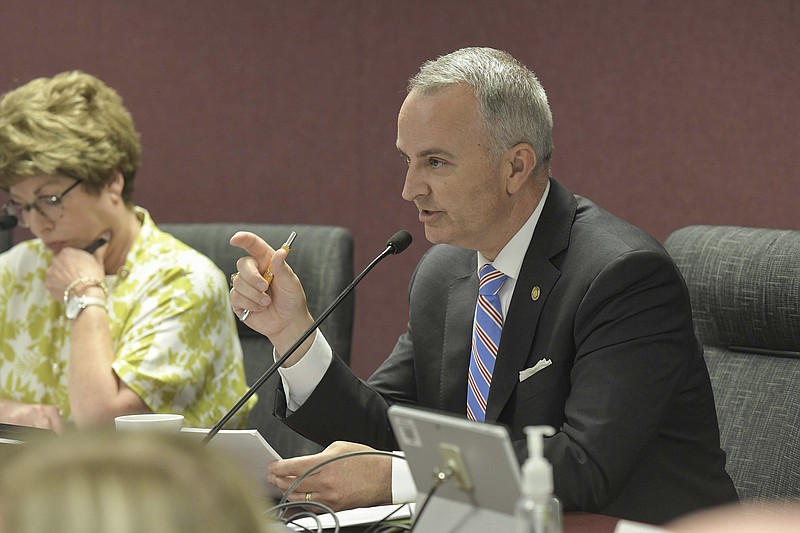Missouri lawmakers questioned the requirements and projected growth of a couple of state grant programs intended to support students going to college and workers looking to skill-up.
Leroy Wade, interim commissioner of the Missouri Department of Higher Education and Workforce Development, fielded questions Wednesday afternoon from the House Appropriations Subcommittee on Education. The committee briskly walked through the department's budget but drew attention to federal hurdles to state scholarship awards and questioned funding for the Fast Track Workforce Incentive Grant.
Gov. Mike Parson is recommending a $1.4 billion budget for MDHEWD, which includes stable and increased funding for scholarship and grant programs and additional funding for higher education institutions.
Most of Missouri's financial aid programs for students graduating high school require completion of the Free Application for Federal Student Aid (FAFSA).
In discussing the A+ program, Rep. Tim Taylor, R-Bunceton, said the information FAFSA requires of students to be considered for aid is "invasive."
Rep. Doug Richey, R-Excelsior Springs and another member of the committee, said he expects the state's FAFSA requirements to become an "increasingly controversial issue."
He described the system as an "ever-expanding, data-mining operation" of the U.S. Department of Education that is "asking questions way beyond simply trying to determine financial need."
FAFSA is the usual starting point for getting financial assistance for college. Undergraduate students who demonstrate the greatest financial needs can receive a Pell Grant for up to $6,345, but award amounts often change from year to year based on several factors.
Eligibility for aid is based on the expected family contribution, which is determined through more than 100 FAFSA questions about parent financial information, household size and dependency status. The federal program only considers students independent from parents if they are 24 years old, married, in the military or have children of their own.
More than 70 percent of students who responded to a 2020 survey conducted by MDHEWD said they were financially independent from their parents. And students routinely reported FAFSA does not accurately determine how much their families can financially contribute to college.
College tuition and fees, meanwhile, have increased 900 percent since 1980, according to the Bureau of Labor Statistics.
"It's a bane, in terms of what you have to go through to do this," Richey said.
Rep. Jamie Gragg, R-Ozark, added the process of filing FAFSA with his son who had completed the requirements for A+ "seemed like more of a drain than something he'd already worked hard for."
"Is there a way we can work around that?" he asked. "Is there something we can do to fix that?"
Wade responded that legislators have introduced bills in the past to make A+ the first program that would fund eligible applicants, but they haven't gone anywhere. If a student receives a Pell Grant and is eligible for A+ Scholarship funding, the federal Pell Grant is required to be applied first.
Missouri wouldn't be able to afford the A+ program becoming a first-dollar scholarship program, said committee vice chair Brenda Shields, R-St. Joseph. The state needs students to draw down federal dollars first, she said. Most universities require FAFSA to access institutional aid as well, she added.
"We're paying them, we might as well make sure we bring them down," Shields said.
Rep. Kevin Windham, the committee's ranking Democrat from St. Louis, expressed interest in determining the number of students completing all of the requirements of state degree programs, like the tutoring and mentoring requirement associated with the A+ program, but not getting funding because it's a last-dollar scholarship.
Programs like the state's Fast Track Workforce Incentive Grant still give students $500, he pointed out, but A+ doesn't provide anything. Shields said legislators are working on it.
Parson is recommending funding the Fast Track program at $5.2 million but suggests giving the department authority to spend up to $6 million. The scholarship program provides funding to adults going back to the classroom to gain skills in high demand jobs. The program was modified last year to remove its loan-related residency requirements and expand the grant to apprenticeships.
"We believe there's a possibility that this program is really going to begin to grow in a very different way, and we want to ensure we have enough spending authority to be able to fully fund all the students that are eligible," Wade said.
Rep. John Voss, R-Cape Girardeau, questioned why the department needed additional spending authority for the program when it had left more funds unspent than spent over the past two budget cycles.
"You expect the program to grow four times over its historical growth rate?" Voss asked, adding, "There's just no evidence to support that."
"It's a completely different program than it was before, without that loan component," Wade responded. He said the increase is based on growth of similar programs in other states.
Shields said until the update last year, people were nervous to sign up for Fast Track because they would have had to pay the loan back if they didn't complete their studies or moved out of the state within three years of completing their studies.
"They might not have this much growth, but we're sure hoping," she said.
Many of those students would end up at public colleges and universities. The governor is recommending a 7 percent increase to the core funding of each institution, setting the course for a third consecutive year of budget increases.
Wade said an increase of 7 percent is the largest in decades.
Committee Chair Rep. Ed Lewis, R-Moberly, noted some of the recent increases have been consumed by inflation.
"The governor's recommendation is a healthy one," he said. "I just want to point that out because it is one of the bigger-ticket items that we are going to get to look at."
Lawmakers in the House will return to the higher education budget as a full appropriations committee in the next couple of weeks. Lewis said future hearings, which will involve public testimony, have not been arranged yet.

